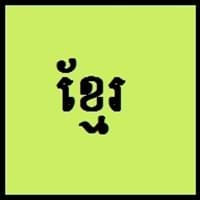Khmer vs Navajo
Countries
Cambodia
United States of America
National Language
Cambodia, Thailand, Vietnam
United States of America
Second Language
Not spoken in any of the countries
Not spoken in any of the countries
Speaking Continents
Asia
North America
Minority Language
Australia, France, United States of America
Not spoken in any of the countries
Regulated By
Not Available
Not Available
Interesting Facts
- Khmer is not the tonal language.
- Khmer language has borrowed philisophical, administrative and technical vocabulary from Sanskrit and Pali.
- Navajo language is tonal language, as it heavily relies on pitch to distinguish between similar words.
- Navajo ethinc group is 2nd largest Native American group.
Similar To
Lao Language
Apache Language
Derived From
Pali and Sanskrit Languages
Not Available
Alphabets in
Khmer-Alphabets.jpg#200
Navajo-Alphabets.jpg#200
Writing Direction
Left-To-Right, Horizontal
Not Available
Thank You
សូមអរគុណអ្នក (saum arkoun anak)
Ahéhee'
How Are You?
អ្នកសុខសប្បាយទេ
Ąąʼ haʼíí baa naniná?
Good Night
ND
Yá'át'ééh hiiłchi'į'
Good Evening
ND
Yá'át'ééh ałní'íní
Good Afternoon
ND
Yá'át'ééh
Good Morning
ND
Yá'át'ééh abíní
I Love You
ND
Ayóó ánííníshí
Dialect 1
Northern Khmer
Navajo1
Where They Speak
Australia, Cambodia, France, Thailand, United States of America
Arizona
How Many People Speak
Not Available
Dialect 2
Khmer Krom
Navajo2
Where They Speak
Vietnam
New Mexico
How Many People Speak
Not Available
Dialect 3
Western Khmer
Navajo3
Where They Speak
Cambodia, Thailand
Utah
Speaking Population
Not Available
Native Name
ភាសាខ្មែរ (bhāsā khmɛ̄r)
Diné Bizaad / Dinék'ehjí
Alternative Names
Cambodian, Khmer
Navaho
French Name
khmer central
navaho
German Name
Kambodschanisch
Navajo-Sprache
Pronunciation
[pʰiːəsaː kʰmaːe]
Not Available
Ethnicity
Khmer, Northern Khmer
Navajo people
Language Family
Austroasiatic Family
Dené–Yeniseian Family
Subgroup
Not Available
Athapascan
Branch
Not Available
Not Available
Early Forms
Proto-Khmer
No early forms
Standard Forms
Modern Khmer
Navajo
Signed Forms
Not Available
Navajo Sign Language
Scope
Individual
Individual
ISO 639 6
Not Available
Not Available
Glottocode
khme1253
nava1243
Linguasphere
Not Available
No data available
Language Type
Living
Living
Language Linguistic Typology
Subject-Verb-Object
Subject-Object-Verb
Language Morphological Typology
Analytic, Isolating
Fusional, Polysynthetic, Synthetic
Khmer and Navajo Language History
Comparison of Khmer vs Navajo language history gives us differences between origin of Khmer and Navajo language. History of Khmer language states that this language originated in 14 whereas history of Navajo language states that this language originated in 1500 CE. Family of the language also forms a part of history of that language. More on language families of these languages can be found out on Khmer and Navajo Language History.
Khmer and Navajo Greetings
People around the world use different languages to interact with each other. Even if we cannot communicate fluently in any language, it will always be beneficial to know about some of the common greetings or phrases from that language. This is where Khmer and Navajo greetings helps you to understand basic phrases in Khmer and Navajo language. Khmer word for "Hello" is ND or Navajo word for "Thank You" is Ahéhee'. Find more of such common Khmer Greetings and Navajo Greetings. These greetings will help you to be more confident when conversing with natives that speak these languages.
Khmer vs Navajo Difficulty
The Khmer vs Navajo difficulty level basically depends on the number of Khmer Alphabets and Navajo Alphabets. Also the number of vowels and consonants in the language plays an important role in deciding the difficulty level of that language. The important points to be considered when we compare Khmer and Navajo are the origin, speaking countries, language family, different greetings, speaking population of these languages. Want to know in Khmer and Navajo, which language is harder to learn? Time required to learn Khmer is 44 weeks while to learn Navajo time required is 88 weeks.





